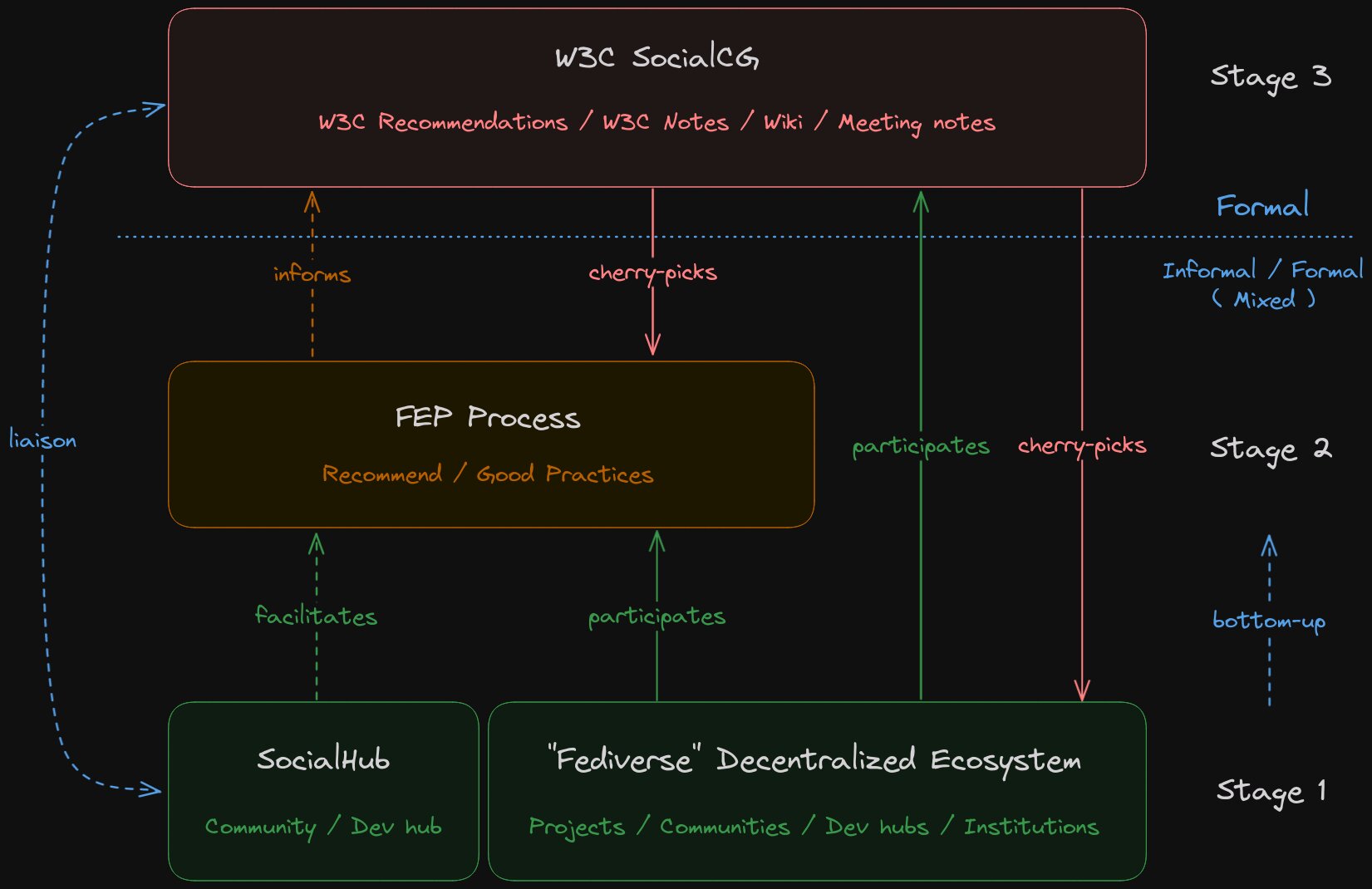With respect to #ActivityPub
-
@puppygirlhornypost2 @hrefna @benpate
This idea of putting together some structured way to describe how other servers should speak to you is one that's come up repeatedly. I'm not all that optimistic about it. I have no idea what the other party could or should do with that info. It's not a problem that's solvable at run time. At least not with the resources and constraints we actually have. -
Jenniferplusplusreplied to Jenniferplusplus last edited by
@puppygirlhornypost2 @hrefna @benpate
I get why people are doing it. It's the thing that would make AP an actual protocol. But only if it was done in advance, at design time. So that implementing the protocol meant producing and expecting those behaviors.I don't think you can get from A to B with FEPs. You have to start fresh, with a successor protocol that actually defines those behaviors.
-
@[email protected] @[email protected] @[email protected] I mean I completely agree this should have been part of the core design. Adding it after is a bandaid and it's not going to fix instance software that cannot support it. Still... better than what they're doing with instance version strings
-
@puppygirlhornypost2 @hrefna @benpate It's marginally better than doing compatibility divination based on user agent strings, yes.
But only marginally.
-
Fundamentally though I think what is required is:
1. A working group
2. Chartered outside of the w3c
3. That does not work piecemeal
4. With a vision to move past AP and a willingness to break compatibility -
@jenniferplusplus @puppygirlhornypost2 @hrefna @benpate the issue with writing a new protocol instead of extending an existing one is that it isn't worth anything without anyone actually using it, and getting software developers to implement a completely new protocol instead of adding extensions to their current implementation is a much more difficult task
-
@jenniferplusplus @puppygirlhornypost2 @hrefna
Do you think some sort of overlay is possible? Something compatible with old school AP, but streamlined and rationalized for actual implementation? Something like HTML “strict” mode, or even the simplification that turned SGML into HTML in the first place.
Maybe the first step is to get a gang together and work out the four or five biggest issues we actually want to solve (including. HTTP digs omg), then focus in the mechanism afterward.
-
@hrefna Yes. Exactly this. I would personally suggest that the best target to aim for, in compatibility terms, is "possible to develop incrementally, and relatively easy to extend from existing AP logic"
-
@lily @jenniferplusplus @puppygirlhornypost2 @hrefna
I agree. We must build on AP, not throw it away. The model that makes sense to me is “strict” mode. I know LitePub tried this, but I don’t know why it failed. Perhaps that’s a starting point for making a successful change.
-
/etc/init.d/witch.navireplied to Hrefna (DHC) last edited by@hrefna @smallcircles
i do want to (try) to start a wayland-protocols-like process for FEPs
extensions requires ACKs from current implementation maintainer, and 2 actual real world implementations -
@benpate @puppygirlhornypost2 @jenniferplusplus @hrefna what is strict mode?
-
@hrefna given how [w3c accepts drm money](https://www.defectivebydesign.org/w3c), i don't know much about the prospects of fediverse under w3c control
-
- With a vision to move past AP and a willingness to break compatibility
I think alone clearly stating what this vision is, and formulating acceptance criteria for it, would be of immense help.
My personal acceptance criteria (of a social networking protocol) is: When building a recipe sharing app, a developer has to worry more about converting three tea spoons of salts into sensible units, than what the exact data structure that represents a message is, or how other applications display the recipe (if they even do).
-
@hrefna i wonder if the ietf might be a better forum for this
-
smallcircles (Humanity Now 🕊)replied to Helge last edited by
-
@noah ATProto thinks so. Last I checked that’s where they wanted to standardize
-
@hrefna yeah, for a protocol like ap or atproto, the ietf is probably as well-setup as you're going to get
-
@lily @puppygirlhornypost2 @jenniferplusplus @hrefna @benpate
Think its worth looking at the PDSes from ATProto here. Adverse Interoperability is a thing, and the Bluesky people are actually not that adverse at all currently to experiments. If you're looking to extend a protocol because of the value of the userbase, atproto might be just as logical of a choice.
thinking in this direction https://berjon.com/ap-at/, but instead of AP its a modified version of AP
-
smallcircles (Humanity Now 🕊)replied to Ben Pate 🤘🏻 last edited by
@benpate @lily @jenniferplusplus @puppygirlhornypost2
@hrefna> We must build on AP
That is but one of many options and variations that circulate. There's quite a few people pondering some kind vNext social protocol, but whether there is any alignment for a collective effort should first be investigated. What do we want of this protocol? Until then there cannot be MUSTs.
@helge put it well in https://mymath.rocks/objects/8ba68883-a0f7-4ee2-874e-27dc9eb514bd in that the DX should shield from all these technical layers.
-
smallcircles (Humanity Now 🕊)replied to 1A last edited by
This is specifically addressed by considering the Fediverse to be part of a bottom up 3-stage standardization of which also the FEP is part, among others. Here there's no such thing as "control" but things bubble up to W3C from a decentralized ecosystem. See:

3-Stage Standards Process: Guaranteeing an open and decentralized ecosystem
Open ecosystem, open ecosystem, open ecosystem In various channels where the Standards Process is discussed there’s mention of a 2-stage structure that goes like: FEP → W3C. As I proposed many times before (like here, a…

SocialHub (socialhub.activitypub.rocks)

 This!
This!